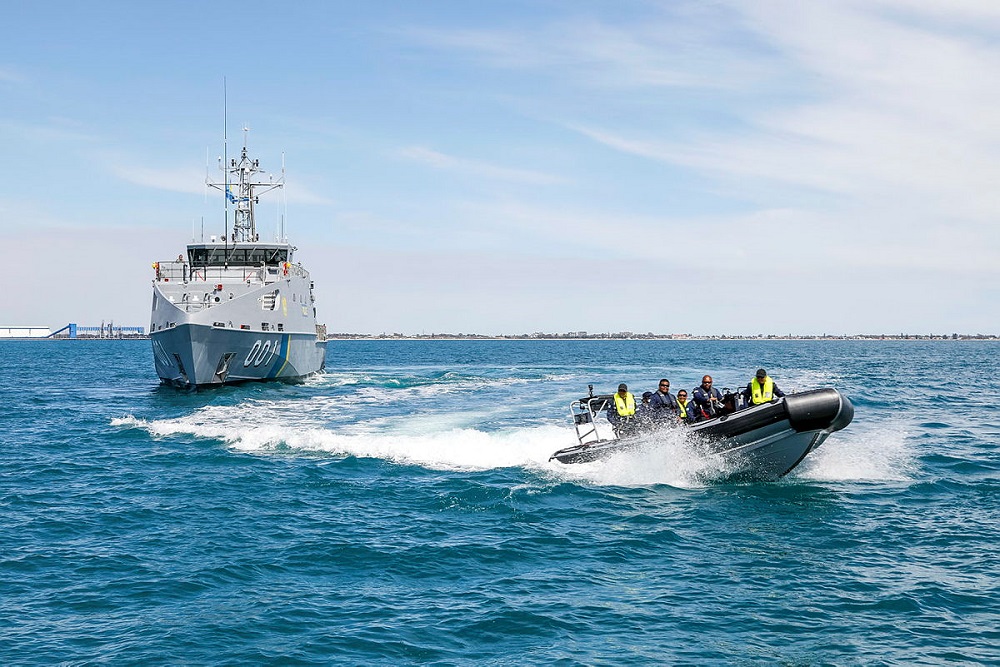
Ricky Ponting, one of the most successful captains of an Australian cricket team, once described his mindset at the batting crease: ‘In my head, I don’t see the fielders. I only see the gaps.’
Indian Prime Minister Narendra Modi’s visit to Papua New Guinea last month was his second to the Pacific islands region. His last visit was in 2014, to Fiji, and while the intervening period may seem long, it’s worth recalling that no Indian prime minister had visited the region since Indira Gandhi went to Fiji in 1981, 33 years earlier.
Modi’s trip to PNG, and India’s increasing engagement with the region, show that New Delhi is beginning to see the gaps in the field. Australia may well be an effective partner for India, particularly in addressing the capacity constraints of Pacific island countries in maritime security.
India already plays a leading role in augmenting the maritime security capabilities of smaller countries in the Indian Ocean region. This includes assistance in maritime law enforcement and domain awareness, and the provision of boats and aircraft to regional partners. However, the Pacific has remained beyond the limits of India’s strategic horizons. Even with its new ‘Act East’ policy, India has been unable to stretch its resources, or to marshal its intentions in any significant manner, in the western Pacific region. Faced with serious threats along its northern land borders, and a stretched navy and coastguard, it’s unlikely that India, by itself, could be effective in strengthening the maritime security capabilities of Pacific island countries.
It was strange that maritime security didn’t feature in the action plan that emerged from the third summit of the Forum for India–Pacific Islands Cooperation in Port Moresby. There are many reasons why the issue should have been high in the agenda. Despite India’s geographical displacement from the Pacific, it’s evident that India enjoys the trust of many Pacific island countries as a natural partner in helping address their strategic concerns, particularly those related to climate change.
India is generally viewed as a viable, third alternative to the great powers, particularly to China, whose aid tends to be riddled with geopolitical traps. Moreover, India has considerable experience in tackling the types of maritime security threats that the Pacific island countries are vulnerable to. Interestingly, in 2017, India and Fiji signed an agreement to expand defence cooperation in maritime security. It is only logical to extend the same to other Pacific island countries, and to build on Australia’s experiences working in this area.
Australia has sustained a long-term commitment to supporting Pacific island countries, particularly through security cooperation that encompasses the entire spectrum from defence to human security. While there are several concurrent programs in place, India can easily join forces with Australia in three specific areas to bring greater value to these efforts.
First, India can contribute substantially to the Pacific Fusion Centre in Vanuatu, which provides strategic assessments and advisory functions to member countries in tackling security issues. India has considerable experience in developing domain-awareness solutions, including the Information Fusion Centre – Indian Ocean region. India’s expertise in maritime surveillance equipment, such as shore-based radars, automatic identification system transponders, and satellite-based surveillance systems, all of which it has provided in aid to Indian Ocean countries, would be particularly useful. India’s contribution to the Pacific Fusion Centre could also extend to improving maritime security software and other technical support.
The second facet of Pacific maritime security that India and Australia can jointly strengthen is training. The Indian Navy has a robust program for training international naval personnel through a range of basic and advanced courses for sailors and officers. Several Fijian military personnel have already trained in Indian naval establishments. India’s defence ministry could collaborate with the Australia Pacific Security College to deliver professional training modules to military and civilian personnel from Pacific island countries. India and Australia could also extend operational exposure to naval personnel from Pacific island countries by including them as observers during bilateral and multilateral exercises such as AUSINDEX and Malabar.
Third, India could substantially augment the Pacific Maritime Security Program, under which Australia provides patrol boats, associated training and maintenance support to Pacific island countries. The program has been successful in enhancing the maritime security capabilities of Pacific countries, but increasing security challenges will require that it not only be sustained, but substantially augmented. The similar support India provides to Indian Ocean island countries could well be extended to supplement Australia’s efforts and help strengthen maritime security capacity-building in the Pacific islands region.
India’s engagement with Pacific island countries would benefit from appointing a dedicated defence adviser to the region, possibly based at the high commission in Suva, Fiji. Currently, the defence adviser at the high commission in Australia performs this role. Besides assuring Pacific partners of India’s intent to engage constructively, such a move could also facilitate greater collaboration with Australia in capacity-building efforts.
One recent article highlighted the positive impact of India’s increasing involvement in the Pacific and encouraged Australia to not ‘get in the way’. If Australia and India join forces in building maritime security capabilities in the Pacific islands region, they could yield even better outcomes.
This article is part of the Australia India Institute’s defence program undertaken with the support of the Department of Defence. All views expressed in this article are those of the author only.

